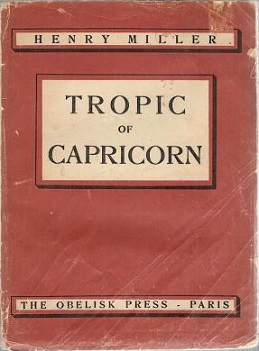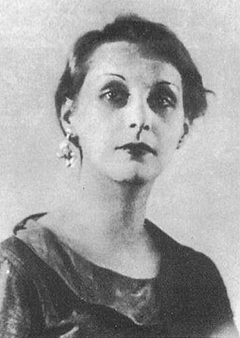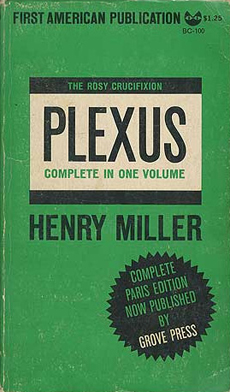
Henry Valentine Miller was an American novelist, short story writer and essayist. He broke with existing literary forms and developed a new type of semi-autobiographical novel that blended character study, social criticism, philosophical reflection, stream of consciousness, explicit language, sex, surrealist free association, and mysticism. His most characteristic works of this kind are Tropic of Cancer, Black Spring, Tropic of Capricorn, and the trilogy The Rosy Crucifixion, which are based on his experiences in New York City and Paris. He also wrote travel memoirs and literary criticism, and painted watercolors.
Dark Knight may refer to:
Fire is the rapid oxidation of a material in the chemical process of combustion.

Tropic of Cancer is an autobiographical novel by Henry Miller that is best known as "notorious for its candid sexuality", with the resulting social controversy considered responsible for the "free speech that we now take for granted in literature." It was first published in 1934 by the Obelisk Press in Paris, France, but this edition was banned in the United States. Its publication in 1961 in the United States by Grove Press led to obscenity trials that tested American laws on pornography in the early 1960s. In 1964, the U.S. Supreme Court declared the book non-obscene. It is regarded as an important work of 20th-century literature.
A bear is a carnivoran mammal of the family Ursidae.

Tropic of Capricorn is a semi-autobiographical novel by Henry Miller, first published by Obelisk Press in Paris in 1939. A prequel of sorts to Miller's first published novel, 1934's Tropic of Cancer, it was banned in the United States until a 1961 Justice Department ruling declared that its contents were not obscene.
The bearcat, also known as the binturong, is a viverrine mammal from Southeast Asia.

Barnet Lee "Barney" Rosset, Jr. was a pioneering American book and magazine publisher. An avant-garde taste maker, he founded Grove Press in 1951 and Evergreen Review in 1957, both of which gave him platforms for curating world-class and, in several cases, Nobel prize-winning work by authors including Samuel Beckett (1969), Pablo Neruda (1971), Octavio Paz (1990), Kenzaburō Ōe (1994) and Harold Pinter (2005).

June Miller was the second wife of novelist Henry Miller. He wrote prolifically about her and their relationship in his books, usually using the pseudonyms Mona or Mara interchangeably. She also appears prominently in the early diaries of Anaïs Nin.

The Rosy Crucifixion, a trilogy consisting of Sexus, Plexus, and Nexus, is a fictionalized account documenting the six-year period of Henry Miller's life in Brooklyn as he falls for his second wife June and struggles to become a writer, leading up to his initial departure for Paris in 1928. The title comes from a sentence near the end of Miller's Tropic of Capricorn: "All my Calvaries were rosy crucifixions, pseudo-tragedies to keep the fires of hell burning brightly for the real sinners who are in danger of being forgotten."

Brenda Venus is an American model, writer, actress, and filmmaker.
"Inside the Whale" is an essay in three parts written by George Orwell in 1940. It is primarily a review of Tropic of Cancer by Henry Miller with Orwell discoursing more widely over English literature in the 1920s and 1930s. The biblical story of Jonah and the whale is used as a metaphor for accepting experience without seeking to change it, Jonah inside the whale being comfortably protected from the problems of the outside world. It was published, alongside two other pieces by Orwell, 11 March 1940 by Gollancz in Orwell's first collection of essays, Inside the Whale and Other Essays.
The Crossing may refer to:
Believer(s) or The Believer(s) may refer to:
Dukes are titles and office of nobility.

Moloch: or, This Gentile World is a semi-autobiographical novel written by Henry Miller in 1927-28, initially under the guise of a novel written by his wife, June. The book went unpublished until 1992, 65 years after it was written and 12 years after Miller's death. It is widely considered to be of interest more as a study of Miller's artistic growth than as a worthy piece of fiction.

Tropic of Cancer is a 1970 American drama film directed by Joseph Strick, who also co-wrote the screenplay with Betty Botley. It is based on Henry Miller's 1934 autobiographical novel Tropic of Cancer. The film stars Rip Torn, James T. Callahan, David Baur, Laurence Lignères, Phil Brown and Dominique Delpierre. The film was released on February 27, 1970, by Paramount Pictures.

Panda Bear Meets the Grim Reaper is the fifth studio album by American recording artist Panda Bear. Coproduced by Sonic Boom of Spacemen 3, it was released on January 9, 2015, by the Domino Recording Company. Panda Bear Meets the Grim Reaper was preceded by the digital release of an extended play, Mr Noah, and two singles, "Mr Noah" and "Boys Latin". It was followed by the extended play Crosswords.
The Tropic of Capricorn is the more southerly circle of latitude of the Earth's tropics region.







